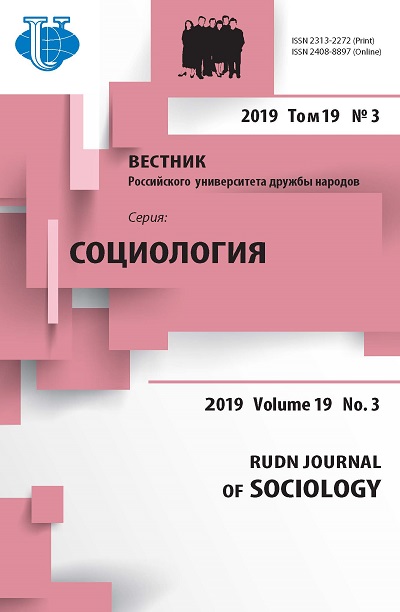Education in digital society: A regional aspect
- Authors: Patsiorkovskiy V.V.1, Kruhmaleva O.V.2,3
-
Affiliations:
- Institute for Socio-Economic Studies of Population of the Russian Academy of Sciences
- Peoples’ Friendship University of Russia (RUDN University)
- Lomonosov Moscow State University
- Issue: Vol 19, No 3 (2019)
- Pages: 419-431
- Section: Contemporary society: the urgent issues and prospects for development
- URL: https://journals.rudn.ru/sociology/article/view/21677
- DOI: https://doi.org/10.22363/2313-2272-2019-19-3-419-431
- ID: 21677
Cite item
Full Text
Abstract
The article considers the features of the spatial distribution of educational and scientific organizations in Russia as an important component of digital society. Based on the extensive sociological and statistical data, the article explains the need to revise the existing approach to the organizational structure of the higher education system taking into account the “5-100” projects and the creation of supporting and federal universities aimed at strengthening the system of higher professional education in the regions. The authors analyze national programs, in particular the national projects “Education” and “Science”, in terms of the new approaches to their territorial organization. The article aims at analyzing the regional accessibility of the main levels of education, and defines as its indicator the educational services of all levels provided in the region. The article is based on the hypothesis that an increase in the spatial accessibility of basic levels of education makes an important contribution to sustainability and accelerates social development. The authors note that all adopted programs and relatively new structural elements of higher education imply an increase in budgetary funding. Given the size of this funding, the gap between regional systems grows and the inclusion of new participants (universities) in the circle of the strongest educational institutions becomes more problematic. Meanwhile, it is the system of higher education and related scientific organizations that is one of the main drivers of the regional development, which determines its human potential and place in the country’s economy.
About the authors
V. V. Patsiorkovskiy
Institute for Socio-Economic Studies of Population of the Russian Academy of Sciences
Author for correspondence.
Email: patsv41@gmail.com
доктор экономических наук, главный научный сотрудник Института социально-экономических проблем народонаселения Российской академии наук
Nakhimovsky Prosp., 32, Moscow, 117218, RussiaO. V. Kruhmaleva
Peoples’ Friendship University of Russia (RUDN University); Lomonosov Moscow State University
Email: kruhoks@yandex.ru
кандидат социологических наук, доцент кафедры социологии Российского университета дружбы народов; заведующая отделом центра стратегии развития образования Московского государственного университета им. М.В. Ломоносова
Miklukho-Maklaya St., 6, Moscow, 117198, Russia; Leninskie Gory, 1-46, Moscow, 119991, RussiaReferences
- Aleshkovsky I.A., Kruhmaleva O.V. Zhiznennye plany i professionalnye oriyentatsii molodezhi: sotsiologichesky analiz [Life plans and professional orientations of the youth: A sociological analysis]. Alma Mater. 2018; 10 (In Russ.).
- Bulatova T.A., Glukhov A.P. Faktory privlecheniya obrazovatelnykh migrantov (na primere sibirskikh vuzov) [Attracting factors for educational migrants (on the example of Siberian universities)]. RUDN Journal of Sociology. 2019; 19 (1) (In Russ.).
- Bulgakov S.N. Filosofiya khozyaystva [Philosophy of Economy]. Moscow: Institut russkoy tsivilizatsii; 2009 (In Russ.).
- Issledovanie mezhdunarodnoy konsaltingovoy kompanii Boston Consulting Group [Research of the international consulting company Boston Consulting Group]. https://www.finanz.ru/ novosti/aktsii/polovina-rossiyskikh-uchenykh-zayavili-o-zhelanii-emigrirovat-1027322119 (In Russ.).
- Issledovanie “Tsennostnye oriyentatsii rossiyskogo studenchestva” [The study “Value orientations of the Russian students”]. Moscow: NIU VShE; 2017 (In Russ.).
- Itogovy otchet o rezultatakh analiza sostoyaniya i perspektiv razvitiya sistemy obrazovaniya za 2017 god [Final report on the results of the analysis of the state and prospects of the education system development in 2017]. Moscow: Minobrnauki; 2017 (In Russ.).
- Klyachko T. Kak ostanovit utechku mozgov iz Rossii? [How to stop the brain drain from Russia?]. Argumenty i fakty. No. 15. 11.04.2018 (In Russ.).
- Kontseptsiya ustoychivogo razvitiya selskikh territoriy Rossiyskoy Federatsii na period do 2020 goda [Concept of the Sustainable Development of Rural Territories of the Russian Federation up to 2020]. http://www.government.ru/gov/results/13358 (In Russ.).
- Konstantinovsky D.L. Neravenstvo i obrazovanie: Opyt sotsiologicheskikh issledovaniy zhiznennogo starta rossiyskoy molodezhi (1960-e gody — nachalo 2000 kh) [Inequality and Education: Sociological Studies of the Life Career of the Russian Youth (the 1960s — early 2000s)]. Moscow: TSSP; 2008 (In Russ.).
- Konstantinovsky D.L., Popova E.S. Molodezh, rynok truda i ekspansiya vysshego obrazovaniya [Youth, labor market and expansion of higher education]. Sotsiologicheskie Issledovaniya. 2015; 11 (In Russ.).
- Lazhentsev V.N. Territorialnoe razvitie kak ekonomiko-geograficheskaya deyatelnost (teoriya, metodologiya, praktika). Novye issledovaniya po regionalnoy ekonomike [Territorial development as an economic and geographical activity (theory, methodology, practice). New studies on regional economy]. Ekonomika Regiona. 2013; 1 (In Russ.).
- Leshukov O.V., Frumin I.D. Flagmanskie universitety: ot sovetskogo opyta k novoy modeli [Flagship universities: From the Soviet experience to a new model]. Universitetskoe Upravlenie: Praktika i Analiz. 2017; 21 (4) (In Russ.).
- Lupenkova E.S., Medvedeva E.I. Raskhody semey na obrazovanie v Rossii i za rubezhom [Family spending on education in Russia and abroad]. Dokhody, raskhody i sberezheniya naseleniya Rossii. Moscow: ISEPN RAN; 2018 (In Russ.).
- Obrazovanie v Rossii—2017. Statistichesky byulleten [Education in Russia—2017. Statistical Bulletin]. Moscow: Moskovsky tekhnologichesky universitet; 2017 (In Russ.).
- Natsionalnye proekty “Obrazovanie” i “Nauka” [National projects “Education” and “Science”]. http://government.ru/projects/selection/741/35675 (In Russ.).
- Patsiorkovskiy V.V. Bolshaya semya i usadebnoe domokhozyaystvo — sotsialnaya norma zhizni lyudey [Big family and the manor household as a social norm of people’s lives]. Nastoyashchee i budushchee semyi v menyayushchemsya mire. Vol. 2. Moscow: Ekonomicheskoe obozrenie; 2018 (In Russ.).
- Regiony Rossii. Sotsialno-ekonomicheskie pokazateli—2017 [Regions of Russia. Social-Economic Indicators—2017]. Moscow: Rosstat; 2017 (In Russ.).
- Simon B. Obshchestvo i obrazovanie [Society and Education]. Moscow: Progress; 1989 (In Russ.).
- Toffler A. Tretya volna [The Third Wave]. Moscow: AST; 2010 (In Russ.).
- Sheregi F.E., Kharcheva V.G., Serikov V.V. Sotsiologiya obrazovaniya: prikladnoy aspect [Sociology of Education: An Applied Aspect]. M.: Academia; 2001 (In Russ.).
- Nieto S. Public education in the XX century and beyond: High hopes, broken promises and an uncertain future. Harvard Educational Review. 2005; 75 (1).
Supplementary files













